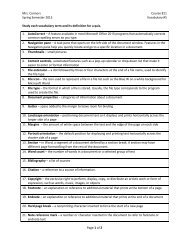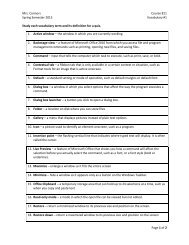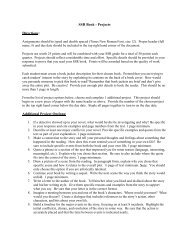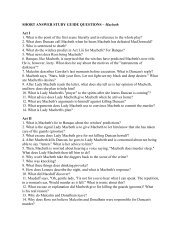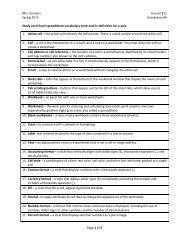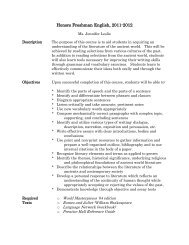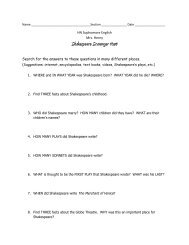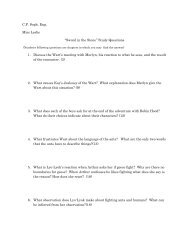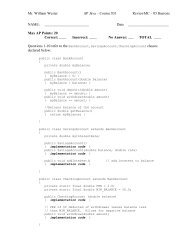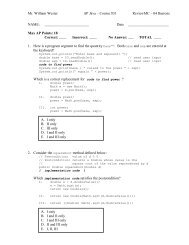Create successful ePaper yourself
Turn your PDF publications into a flip-book with our unique Google optimized e-Paper software.
Mr. William Wester AP Java – Course 831 ReveiwMC – <strong>02</strong> <strong>Barrons</strong><br />
NAME: ________________________ Date ______________________<br />
Max AP Points: 10<br />
Correct: ____ Incorrect: ____ No Answer: ___ TOTAL ____<br />
1. Which declaration will cause an error?<br />
I. ArrayList stringList = new ArrayList();<br />
II. ArrayList intList = new ArrayList();<br />
III. ArrayList compList = new ArrayList();<br />
A. I only<br />
B. II only<br />
C. III only<br />
D. I and III only<br />
E. II and III only<br />
2. Consider these declarations:<br />
ArrayList stringList = new ArrayList();<br />
String ch = “ ”;<br />
Integer intOb = new Integer(5);<br />
Which statement will cause an error?<br />
A. strList.add(ch);<br />
B. strList.add(new String(“handy andy”);<br />
C. strList.add(intOb.toString());<br />
D. strList.add(ch + 8);<br />
E. strList.add(intOb + 8);
Mr. William Wester AP Java – Course 831 ReveiwMC – <strong>02</strong> <strong>Barrons</strong><br />
3. Let list be an ArrayList containing these elements:<br />
2 5 7 6 0 1<br />
Which of the following statements would not cause an error to occur? Assume that each<br />
statement applies to the given list, independent of the other statements.<br />
A. Object ob = list.get(6);<br />
B. Integer intOb = list.add(3.4);<br />
C. list.add(6, 9);<br />
D. Object x = list.remove(6);<br />
E. Object y = list.set(6, 8);<br />
4. Refer to method insert below:<br />
// Precondition: ArrayList list contains Comparable values<br />
// sorted in decreasing order.<br />
// Postcondition: Element inserted in its correct position<br />
// in list.<br />
public void insert(ArrayList list, Comparable element)<br />
{<br />
int index = 0;<br />
while (element.compareTo(list.get(index)) < 0)<br />
index++;<br />
list.add(index, element);<br />
}<br />
Assuming that the type of element is compatible with the objects in the list, which is a true<br />
statement about the insert method?<br />
A. It works as intended for all values of element.<br />
B. It fails for all values of element.<br />
C. If fails if element is greater than the first item in list and works in all other<br />
cases.<br />
D. It fails if element is smaller than the last item in list and works in all other<br />
cases.<br />
E. It fails if element is either greater than the first item or smaller than the last<br />
item in list and works in all other cases.
Mr. William Wester AP Java – Course 831 ReveiwMC – <strong>02</strong> <strong>Barrons</strong><br />
5. Consider the following code segment, applied to list, an ArrayList of Integer values.<br />
int len = list.size();<br />
for (int k = 0; k < len; k++)<br />
{<br />
list.add(k + 1, new Integer(k));<br />
Object x = list.set(k, new Integer(k + 2));<br />
}<br />
If list is initially 6 1 8, what will it be following execution of the code segment?<br />
A. 2 3 4 2 1 8<br />
B. 2 3 4 6 2 2 0 1 8<br />
C. 2 3 4 0 1 2<br />
D. 2 3 4 6 1 8<br />
E. 2 3 3 2<br />
6. Refer to the following declarations:<br />
String[] colors = {“red”, “green”, “black”);<br />
ArrayList colorList = new ArrayList();<br />
Which of the following correctly assigns the elements of the colors array to colorList?<br />
The final ordering of colors in colorList should be the same as in the colors array.<br />
I. for (String col : colors)<br />
colorList.add(col);<br />
II. for (String col : colorList)<br />
colors.add(col);<br />
III. for (int k = colors.length – 1; k >= 0; k--)<br />
colorList.add(k, colors[k]);<br />
A. I only<br />
B. II only<br />
C. III only<br />
D. II and III only<br />
E. I, II, III
Mr. William Wester AP Java – Course 831 ReveiwMC – <strong>02</strong> <strong>Barrons</strong><br />
7. Consider writing a program that reads the lines of any text file into a sequential list of lines.<br />
Which of the following is a good reason to implement the list with an ArrayList of<br />
String objects rather than an array of String objects?<br />
A. The get and set methods of ArrayList are more convenient than the []<br />
notation for arrays.<br />
B. The size method of ArrayList provides instant access to the length of the list.<br />
C. An ArrayList can contain objects of any type, which leads to greater<br />
generality.<br />
D. If any particular text file is unexpectedly long, the ArrayList will<br />
automatically be resized. The array, by contrast, may go out of bounds.<br />
E. The String methods are easier to use with an ArrayList than with an array.<br />
8. Consider writing a program that produces statistics for long lists of numerical data. Which<br />
of the following is the best reason to implement each list with an array of int (or double),<br />
rather than an ArrayList of Integer (or Double) objects?<br />
A. An array of primitive number types is more efficient to manipulate than an<br />
ArrayList of wrapper objects that contain numbers.<br />
B. Insertion of new elements into a list is easier to code for an array than for an<br />
ArrayList.<br />
C. Removal of elements from a list is easier to code for an array than for an<br />
ArrayList.<br />
D. Accessing individual elements in the middle of a list is easier for an array than<br />
for an ArrayList.<br />
E. Accessing all the elements is more efficient in an array than in an ArrayList.
Mr. William Wester AP Java – Course 831 ReveiwMC – <strong>02</strong> <strong>Barrons</strong><br />
Refer to the following classes for Questions 9-10.<br />
public class Coin<br />
{<br />
private double myValue;<br />
private String myName;<br />
}<br />
// constructor<br />
public Coin(double value, String name)<br />
{<br />
myValue = value;<br />
myName = name;<br />
}<br />
// accessors<br />
public String getName()<br />
{ return myName; }<br />
public double getValue()<br />
{ return myValue; }<br />
// Define equals method for Coin objects<br />
public boolean equals(Object obj)<br />
{ implementation code }<br />
// Other methods not shown<br />
// A purse holds a collection of coins<br />
public class Purse<br />
{<br />
private ArrayList coins;<br />
}<br />
// constructors<br />
public Purse()<br />
{ coins = new ArrayList(); }<br />
// Adds a coin to the purse<br />
public void add(Coin aCoin)<br />
{ coins.add(aCoin); }<br />
// Returns total value of coin in purse<br />
public double getTotal()<br />
{ implementation code }
Mr. William Wester AP Java – Course 831 ReveiwMC – <strong>02</strong> <strong>Barrons</strong><br />
9. Here is the getTotal method from the Purse class:<br />
// Returns total value of coin in purse<br />
public double getTotal()<br />
{<br />
double total = 0;<br />
more code<br />
return total;<br />
}<br />
Which of the following is a correct replacement for more code?<br />
A. for (Coin c : coins)<br />
{<br />
c = coins.get(i);<br />
total += c.getValue();<br />
}<br />
B. for (Coin c : coins)<br />
{<br />
Coin value = c.getValue();<br />
total += value;<br />
}<br />
C. for (Coin c : coins)<br />
{<br />
Coin c = coins.get(i);<br />
total += c.getValue();<br />
}<br />
D. for (Coin c : coins)<br />
{<br />
total += coins.getValue();<br />
}<br />
E. for (Coin c : coins)<br />
{<br />
total += c.getValue();<br />
}
Mr. William Wester AP Java – Course 831 ReveiwMC – <strong>02</strong> <strong>Barrons</strong><br />
10. A boolean method find is added to the Purse class:<br />
// Returns true if the purse has a coin that matches aCoin,<br />
// false otherwise.<br />
public boolean find(Coin aCoin)<br />
{<br />
for (Coin c : coins)<br />
{<br />
code to find match<br />
}<br />
return false;<br />
}<br />
Which is a correct replacement for code to find match?<br />
I. if (c.equals(aCoin))<br />
return true;<br />
II. if ((c.getName()).equals(aCoin.getName()))<br />
return true;<br />
III. if ((c.getValue()).equals(aCoin.getValue()))<br />
return true;<br />
A. I only<br />
B. II only<br />
C. III only<br />
D. I and II only<br />
E. I, II, III



